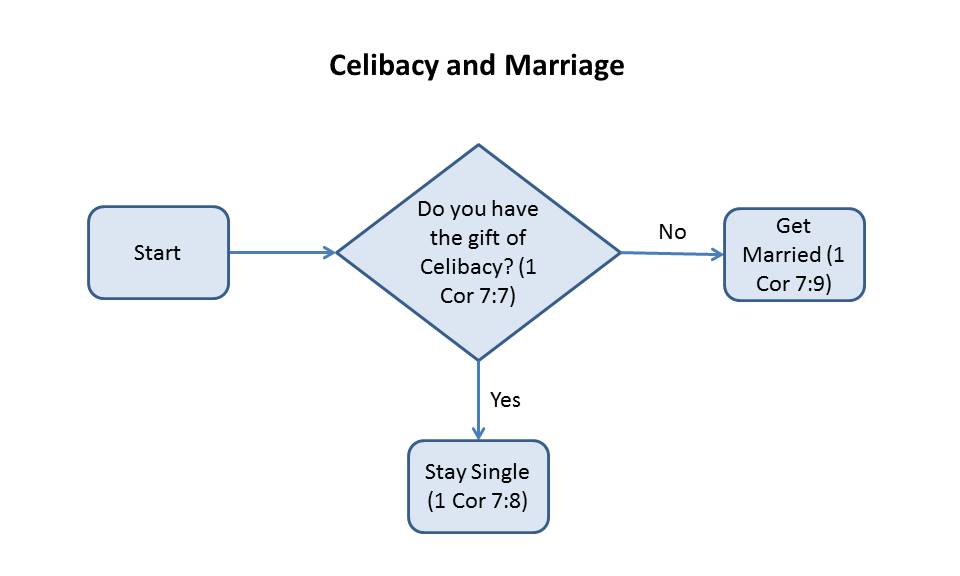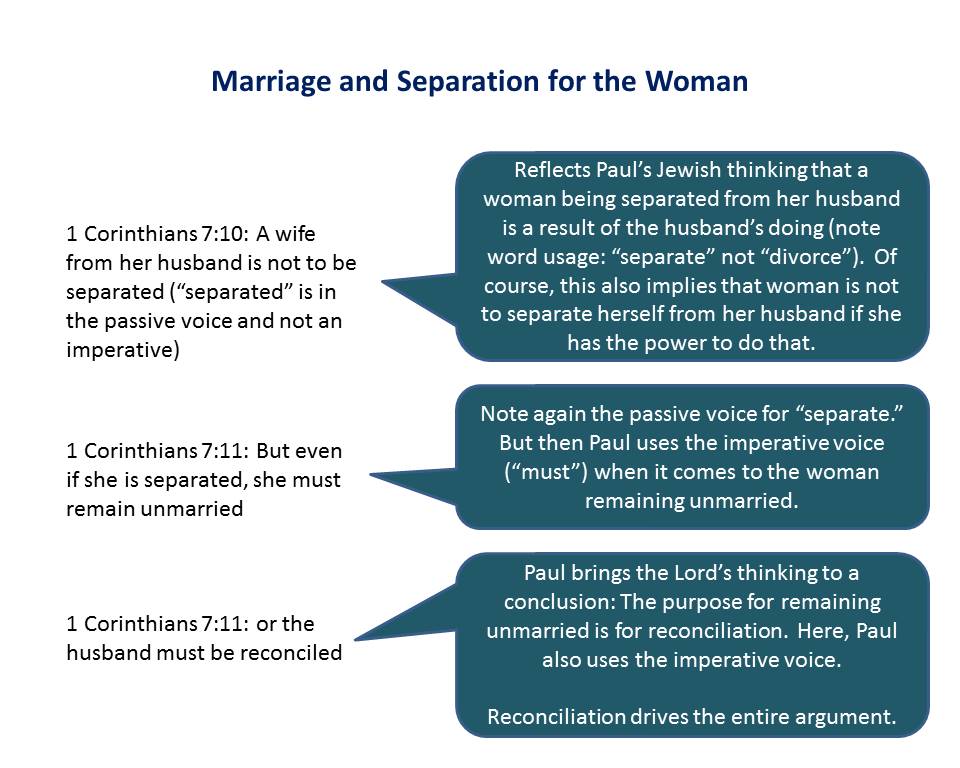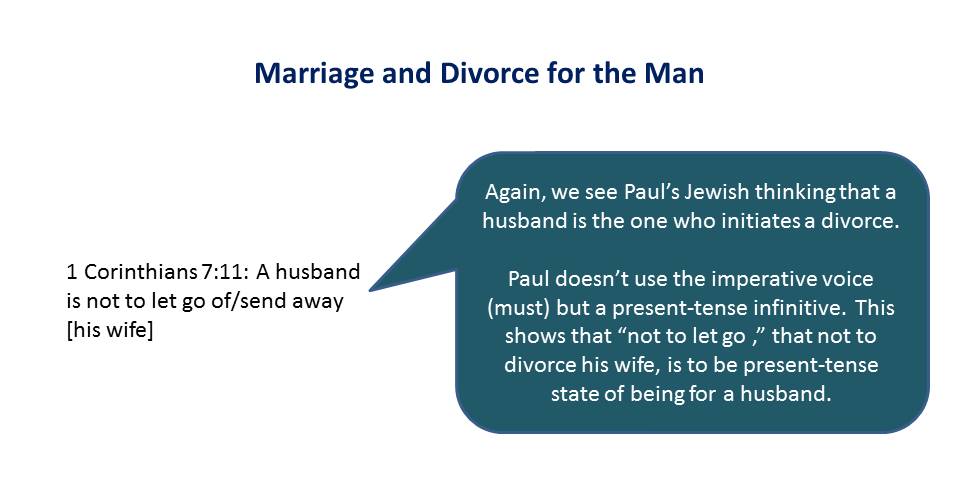 Paul still continues to deal with the topic of sexuality, but now within the context of marriage. We find that 1 Corinthians chapter 7 is in a chiastic structure:
Paul still continues to deal with the topic of sexuality, but now within the context of marriage. We find that 1 Corinthians chapter 7 is in a chiastic structure:
A 7:1-16 Sex relating to those who are or have been married
. B 7:17-24 Being content within one’s vocation
A’ 7:25-40 Sex relating to those not now married
Through such, we learn that Paul teaches that someone is to be content in his circumstances, whether single or married. Yet, within a larger chiastic structure, Paul more-specifically deals with these topics:
A: Duties for those who are married (7:1-7)
. Marriage as it relates to widowers and widows (7:8-9)
. Divorce for Christians (7:10-11)
. Christians married to non-Christians (7:12-16)
. B: Excursus on being content within one’s vocation
A’: The virgins, those who have never married, and marriage (7:25-38)
. Women who are married and their husbands die and remarriage (7:39-40)
Duties for Those Who are Married
We now learn of a letter that Paul had received from the Corinthian congregation. We don’t know what was in that letter except by how Paul responded. Throughout 1 Corinthians, Paul uses an expression, “now concerning,” when referring to that letter (1 Corinthians 7:1, 25; 8:1; 12:1; 16:1).
Read 1 Corinthians 7:1-2
- Concerning the sexual sins and excesses that Paul had dealt with earlier, what had some Corinthians concluded concerning sex?
- Why does Paul say that’s not a practical solution?
Read 1 Corinthians 7:3-4
“Conjugal Rights”: The ESV translates the Greek word opheile as “conjugal rights.” This is beyond a poor translation–it is wrong! Opheile means duty or obligation. The idea is that the husband is giving (it’s a present-tense participle in the Greek, denoting that this is an ongoing action) his wife what he “owes” her because he is her husband, and vice versa.
This is not about rights but serving one’s spouse through the gift of sex. It is not for the husband to demand what he wants from his wife as a “right,” or the other way around. Each serves the other and sees it as a marital duty, carried out in love, and freely given. Pastor’s translation: “The husband is doing his duty for his wife and, likewise, the wife for the husband.”
- What does Paul say about the authority one has over his/her body in a marriage?
- How does that change the sex that takes place between a husband and wife?
Read 1 Corinthians 7:5
- Within a marriage, what should sex not be used as?
“That you [plural] may have time for the Prayer”: What we don’t catch in our English translations is Paul’s use of an expression “the Prayer” to refer to formal prayers during certain times of the day. “The Prayer” as an expression also referred to congregational worship.[1] It’s not that Paul was against a husband and wife choosing to pray in an ad-hoc way with free-form prayers, but that was not what Paul was referring to in this verse.
Meeting with God: In the Old Covenant, the Israelites were commanded not to have sex (Exodus 19:15) before they went “out of the camp to meet God” on “the third day” (Exodus 19:16-17 [Yes, the “third day” foreshadowed Christ resurrection on the third day!]). After that event, God met with Moses because the people had said, “You speak to us… do not let God speak to us, or we will die” (Exodus 20:19). In the New Covenant, a husband and wife are not to allow sex from keeping them from their meeting with God during “the Prayer”; in other words, don’t have sex at the expense of your formal prayers and being in worship.
Read 1 Corinthians 7:6-7
- Discuss: Was Paul married, single, a widower, or divorced?
- When it comes to someone not having sex with another, or having sex, what does Paul say that person should or should not have? (vs. 7)
Gift: The word that Paul uses for “gift” is charisma, which is also the word he used for spiritual gifts in Romans 12:6-8 and later in 1 Corinthians 12. Paul sees both celibacy and sexuality as gifts from God to be used for His glory.
- From the principles that Paul lays out concerning sex within a marriage, extrapolate how husband and wife serve each other in the other areas of their life?
Marriage as It Relates to Widowers and Widows
Read 1 Corinthians 7:8-9
Context of verse 8: Pastor’s translation of vs. 8: “But I say to the unmarried [context = widowers] and the widows: It is good to remain as I am.” Paul doesn’t say “single”; the ESV adds it in there to help the reader. In this case, it messes up Paul’s line of thinking.
In verse 7, Paul had just said, “I wish all were as I myself am.” We know historically that Paul was not married when he wrote that. But then Paul conceded that he knew that all were not as he was: Each has his own gift from God; some have the gift of celibacy, some don’t.
Paul wasn’t telling widowers and widows that is was good to remain single. He was saying that it was good to remain celibate, as he was, unless they “do not have self-control,” which comes with the gift of celibacy. (See “self-control” below.)
- Discuss.
Self-control: Paul used the Greek words, ouk egkrateuomai, to describe someone not having self-control in sexual matters. Although egkrateuomai is a verb, the point is not the ability or willpower to control yourself; it’s whether you have that self-control or not.
This is not a matter of ability but of being: If you have the gift of celibacy, then such “self-control” (as a verb) is natural for you (all the hubbub about sex seems like a nonsensical distraction to you). If you have the gift of sexuality, then wanting to have sex is natural (and forcing yourself to be celibate is not).
Paul had just referred to celibacy as a “gift.” It makes little sense that he would then take away the giftedness of celibacy by pointing the person back to his ability or power to control himself. If you don’t have the gift of celibacy, then you have the gift of sexuality. Instead of burning with passion, Paul advises marriage.
- How has misunderstanding both verse 7 (celibacy is a gift) and verse 9 (you either have that self-control or you don’t) led to many poor practices within the Church?
Divorce for Christians
Read 1 Corinthians 7:10-11
- What does Paul emphasize about who is speaking through his words?
- Why would Paul tell women not to “separate” but men not to “divorce”?
Separate vs. Divorce: Among Jews, only the man could initiate a divorce. But since most of the Corinthian Christians were Gentiles, in Corinth, as in Rome, women had the right to initiate a divorce. Nonetheless, that Paul used the word “separate” instead of “divorce” shows him still thinking in Jewish terms that saw divorce as something a husband, almost always, initiated (Deuteronomy 24:1).
- Reading between the lines, in the culture then, did the Church control whether one was legally married or not with the Roman Empire?
Marriage in the Roman Empire: The state maintained no marriage registry, nor did the state have an office or position with the power to declare a couple to be married (monogamy was the norm for marriage within Rome). To marry, a man and woman needed to be free citizens, past puberty, and intend and consent to be husband and wife. When the bride was escorted into the man’s home, that was considered the “consummation” of the marriage.
For a slave, that required his master’s permission to establish a conjugal relationship known as a contubernium, which was originally a term to denote the smallest military unit, which shared a single tent. Such unions seem to have been as stable as marriages for Roman citizens.
- Discuss: What if reconciliation isn’t possible and someone doesn’t have the gift of celibacy?
The Lord’s command, imperative, to remain unmarried after a divorce is to leave reconciliation and remarriage open as a possibility. That’s the reason behind remaining unmarried. Recognizing that a marital union reflects the union with Christ and the Church (Ephesians 5:23), being divorced is an “unnatural” state for a Christian, which always seeks restoration.
However, if the other person has remarried, then reconciliation and remarriage isn’t possible. Likewise, if reconciliation and remarriage aren’t possible because of the other person’s way of life, then the rationale for remaining unmarried no longer makes sense, especially if one doesn’t have the “gift” of celibacy.
Aphiami: The word Paul uses for divorce is the same as for forgiveness. How God’s forgiveness works is—not to send the person away—but to send his sin away, where it is left behind and no longer separating him from God.
When a Christian husband divorces his wife, he is not being a reflection of Christ to His bride, the Church. Instead, he is an “anti-Christ,” someone who does the opposite of Christ, someone who sends his wife away instead of “leaving behind” the wrongs that may incline him to divorce her.
Discuss: the role of Christian counsel from the pastor and/or other trusted Christians in such a situation.
Discuss: Annulment in place of divorce.
Discuss: Communion practice as it relates to those who are divorced.
Next week: marriage with an unbeliever, and being at peace in your current state.
[1] See Timothy Thorton’s article, “Continuing Steadfast in Prayer—New Light on a New Testament Phrase,” in Expository Times, Volume 83 (1971), pgs. 23-24. See also The Jewish Manumission Inscriptions of the Bosporus Kingdom by Elizabeth L. Gibson, pg. 138. The Beginnings of Christianity, Volume 4 by James H. Ropes, Henry J. Cadbury, and Kirsopp Lake, pgs. 10-11, also mentions this.




